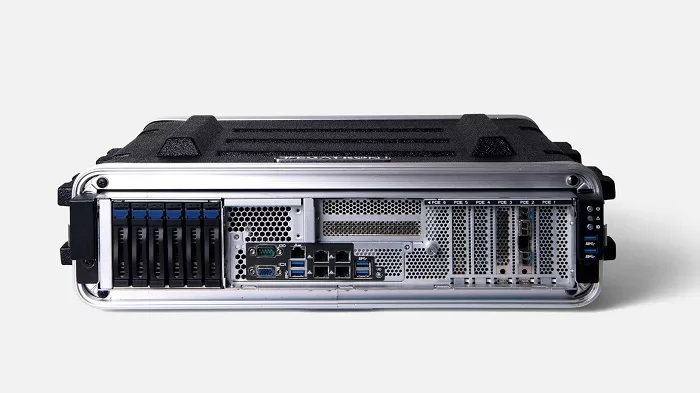Pegatron, Intel Develop a Portable 5G Network Solution for Emergency Responders

At Hsinchu’s fire station, about an hour’s drive from downtown Taipei, Taiwan, firefighters are using a new communications solution when responding to disasters. Pegatron, a leading electronics design and manufacturing company, partnered with Intel to design a portable 5G network-in-a-box base station. The solution is now in use by the city of Hsinchu’s emergency responders, who often struggled with the lack of connectivity in remote areas and mountainous regions.
“This private 5G solution is one of many examples of how technology can save lives, especially in disaster-hit areas.”
–Grace Wang, Intel vice president in the Sales, Marketing and Communications Group and general manager of Intel Taiwan
How It Works: The solution is powered by a portable generator and is highly mobile – it’s about the size of a large suitcase and weighs about 18 kilograms (40 pounds). It fits in the trunk of a vehicle and can be carried as a backpack, and it deploys in minutes on any terrain. It uses a satellite dish to establish high-speed network connectivity with satellites overhead.
Once a backhaul satellite connection is established, a 5G radio antenna establishes a 5G network within the immediate vicinity capable of delivering up to a gigabit per second of throughput available to up to 32 connected devices. The system can be extended to host more users with the addition of more 5G cells.
“In a mission-critical scenario, we need efficient communication. [With] just a small generator, we can power the 5G base station and provide a communication solution for rescue personnel,” said Yang Wen-Kai, commander, Hsinchu City Fire Bureau. Wen-Kai explained that Taiwan’s mountainous terrain creates a unique challenge for his firefighters when existing communications infrastructure can be crippled by power outages.
What Technology Supports It: The portable 5G-in-a-box is powered by a constellation of Intel hardware and software. It’s also compliant to existing 3GPP and open radio access network (ORAN) standards. Co-engineering began in early 2020, and at Intel Vision 2022, Intel CEO Pat Gelsinger demonstrated an early prototype in his opening keynote on the evolution of the digital renaissance.
Each 5G cell includes an Intel® Xeon® Scalable processor and Intel-based Ethernet NIC. On the software side, the Intel® FlexRAN™ reference architecture for wireless access enabled Pegatron engineers to create a scalable cloud-native RAN solution that’s feature-rich and can run on any open cloud-based telecommunications platform.
How Intel Helped: The Intel Taiwan 5G Innovation Center (5GIC) provided both Intel and Pegatron engineers space to meet and collaborate. Established in 2022, 5GIC provides new and existing Taiwan ecosystem customers and partners with the right tools, resources and expertise; the latest technology solutions; and a central location to identify, discuss and solve problems.
What’s Next: Pegatron is evolving the solution with faster technology, including an upgrade that includes 4th Gen Intel® Xeon® Scalable processors with Intel® vRAN Boost. These processors will launch at MWC Barcelona 2023. As more of the world’s networks transform from fixed-function, legacy hardware that’s centralized in one location to modern, virtualized RAN (vRAN) built on programmable, scalable and flexible software-defined platforms, Intel is bringing 5G leadership to the edge, where that computing power is needed most.
As investments in vRAN continue to accelerate, hundreds of ecosystem partners are standardizing on cloud-native Intel compute platforms that offer more network capacity without increasing power bills. Nearly all vRAN deployments today run on Intel. Learn more about Intel’s leadership in the vRAN space next week at Mobile World Congress, Barcelona.
Why It Matters: This low-latency, high-speed and secure 5G network provides a vital lifeline to firefighters who operate in Taiwan’s mountainous areas – challenging geography that makes up about 70 percent of Taiwan – where cellphone networks can be damaged and connectivity options are limited.
Hsinchu firefighters began using the solution in October 2022. With the benefit of high-speed network connectivity established, firefighters can stream high-resolution video from remote areas to aid disaster response efforts. In the past, firefighters relied on long-range handheld walkie-talkies for their communication needs.
“Intel provides powerful hardware, software and engineering expertise to help us implement a scalable and secure 5G infrastructure in a portable form factor that enabled a reliable mobile orbital satellite 5G disaster relief network system now being adopted by Hsinchu City Fire Bureau,” said CY Feng, general manager, BG6 and 5G Product Development Center for Pegatron. “We look forward to continuing working with Intel to provide 5G and leadership computing at the edge to further develop innovative applications.”
Wang added, “As worldwide demand for high-capacity, low-latency private network solutions continue to grow, we will continue on our journey with valued customers like Pegatron to create world-changing technology that enriches the lives of every person on Earth.”
What’s Next: Pegatron is working on an updated version of the platform that will feature more advanced technology, a smaller footprint and a lighter package. Other scalable private 5G networks based on this technology are also being deployed in Taiwan, including at Metro Taipei’s mass rail transit network and at Pegatron’s manufacturing facility.
Source: Intel















